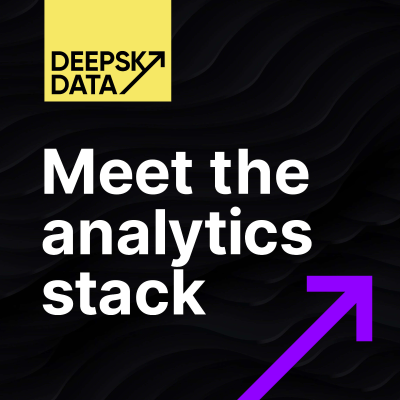
Meet the analytics stack
Podcast de Timo Dechau - deepskydata
Empieza 7 días de prueba
$99.00 / mes después de la prueba.Cancela cuando quieras.

Más de 1 millón de oyentes
Podimo te va a encantar, y no estás solo/a
Rated 4.7 in the App Store
Acerca de Meet the analytics stack
We are talking to founders and thought leaders in the analytics space in this podcast. We learn about the motivations behind the products they offer. We discuss new topics that shape the analytics space. These are exciting times where the data space is exploding, and so are ways to collect and analyze data. Some years ago, it was pretty easy for most companies to decide on an analytics tool. Either you go for an all-purpose solution like Google Analytics. Or you need something special for your mobile app or product team, so Amplitude. Or you just want the raw data without much effort: Segment. Today it has become a science of its own to find the proper tracking & analytics setup. What made it so complicated? - GDPR & Browser protection added more measures what you can track and where to store the data - Google will sunset the old Google Analytics version, so you can only use GA4 in the future - Plenty of more competition in each analytics category (which is a good thing) - New categories like privacy-aware and simple analytics solutions Deciding for a tracking and analytics stack should take a bit. It’s an essential part of your setup, so it should meet your current requirements to some degree (no one can look into the future).
Todos los episodios
9 episodiosIn this episode we have a discussion about the value of a data team in a company, which, naturally, is a huge topic. We talked about how new categories of analytics tools, like Kausa, are changing the role of data teams. Instead of just receiving requests to investigate issues, data teams can now proactively reach out to other teams with interesting patterns and work together to find solutions. This makes the data team a more proactive player within the company and changes the value perception. Overall, it was an interesting conversation about the potential of working with data in new ways.
Our major goal is to focus on our customers. I guess this kind of sentence you will find in any presentation of digital product vendors, maybe even beyond. So people always claim that they take the customers first, that they do everything for their customers. And yes, to some degree they do. In the end, they bring the revenue, and so they might listen to what customer says. But customer focus comes on different levels and talking to Maciej from Piwik Pro shows what real customer dedication looks like. He explains how Piwik Pro is really building around their customer feedback, and for their customer’s use cases. Everything is measured if it solves the problem or not. And you will see this as a constant pattern in this episode. So Maciej started out contributing to Piwik as an open-source project because he needed it for his own product. And then he started to build a consulting business around it. And at some point recognized that it needs a different product beyond the open source one to really solve the client’s use cases. And so it became Piwik Pro and got a completely new foundation. And from the early days, it was built for use cases where data is more sensitive as if you just buy shampoo. Like as government services, health care, or intranets. All before GDPR came around. And now Piwik Pro is on a clear growth trajectory with a lot of early investments and decisions paying off. I hope you enjoy the conversation in the same way I did.
There is a specific kind of person or a particular kind of role, which is usually ignored in data projects and especially in tracking projects. And these are developers. It's pretty shocking - I know. They rarely play an important role in these initial data projects. Even when they finally have an essential role. They ensure that the correct data gets sent to whatever tool you use. It’s often: “Take these 100 events and please implement them fast because we all need them for things you don’t need to care about”. And I can already tell you this is usually an approach that doesn't work out well. And that was interesting when I talked to James from Posthog and asked him, what is your target audience? He immediately answered: developers. We are a developer-first analytics product. This is quite interesting. Because product analytics targets product managers, usually. But Posthog calls itself a Product OS and takes the features beyond classic product analytics. So they are targeting the developers. Well, the persons who are basically building the product. And it makes sense. Developers are the ones who know exactly how a product works. They know precisely where it is the best place to maybe get some insights from. And usually, they have often really good ideas about data. What kind of event could be important to make the product better? This episode was a good lesson for me on how a product is defined when you have a clear idea of your target audience and how your product automatically starts to be different from the usual competition, just because you have a different focus. I hope you enjoy it as well.
Alexander from Elbwalker and I are talking about why tracking implementation is so hard and creates so much frustration on the way, why pure auto-tracking is not the solution, and why context is pure analytics magic. New tracking setups have a lot of really cool high-energy moments just because it's something new. And often we do a new tracking setup replacing an existing tracking setup that was not so good. And so everyone is super motivated in this to create something new and then comes the implementation. And implementation usually sucks up any joy and fun of a tracking setup project Because it's hard to get some resources in the first place and then it takes longer than everyone thought. The developers don't really like to do it. because for them it’s something they don’t do every day. And then things are not implemented in the way that you want to have them implemented. So for me, tracking implementation is still one of the hardest things to do. And Alexander from Elbwalker was so frustrated by this that he started a company to make it better.
Would you start a new product when the category is pretty crowded already What if you start a new product where the category is pretty crowded already? And most of the people that you talk to tell you: maybe not a good idea. But Oliver and Hamzah decided to do it. A new BI tool based on modern data principles and tools. It’s built on top of the metadata that you already have when you use dbt. In the same place where you describe your model with descriptions and columns, you can use Lightdash to define your metrics and dimensions and how these different kinds of data tables relate to each other. This is the metric or semantic layer everyone is talking about. An abstraction layer between your tables in your data warehouse and the place the business users are working with it. So marketing, product, or sales. They basically get a prepared version of the data just for them. With metrics and dimensions for them to work with. And so they don't have to think about how do I get the revenue and where do I get the country information so I can drill it down by country.

Rated 4.7 in the App Store
Empieza 7 días de prueba
$99.00 / mes después de la prueba.Cancela cuando quieras.
Podcasts exclusivos
Sin anuncios
Podcast gratuitos
Audiolibros
20 horas / mes























